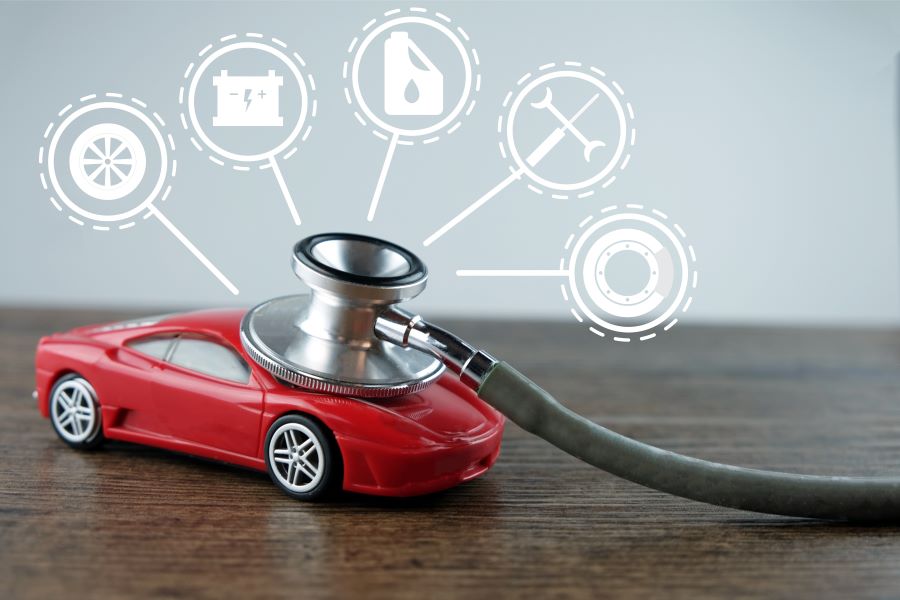To own a car is to know what the pain of inconvenience and expense feels like when it’s fused together; no machine can work 100% of the time. However,
To own a car is to know what the pain of inconvenience and expense feels like when it’s fused together; no machine can work 100% of the time. However, there are a few ways in which we can contribute to both the performance of our vehicles, and their enduring good looks…
Make a habit of routine checks
There are some parts of car maintenance that you don’t have to be qualified to undertake. In fact, it’s best that you, the driver, keep on top of some essential car maintenance checks to ensure your car is safe and roadworthy. This includes:
Tyre tread and pressure – Keep your tyres pumped up to the recommended PSI for your model, and ensure that the tread measures up above the legal limit of 1.6mm. Any lower than this, and it’s time for replacements.
Light function – You need to see and be seen, so rope a friend in to check that the corresponding lights work when you press the brake, go into reverse, indicate, and turn your headlights and fog lights on.
Fluid levels – Your washer fluid, water, coolant, and, of course, oil levels are essential to the smooth running of your car. All of this is accessible under the bonnet, so there’s no excuse not to top up when necessary.

Don’t ignore the warning signs
Both literally and figuratively; if there’s a warning light on your dashboard, or a noise or sensation whilst driving that you don’t recognise, it’s time to chat to a service centre. Ignorance is not bliss in the long run! It’s unlikely these issues will resolve on their own, risking further damage to both the car and your pocket if you neglect to investigate.
Stick to the service schedule
Your car will come with an annual maintenance schedule, referred to as your services, recommended by the manufacturer to keep your car in good working order. This involves someone qualified doing mechanical checks and lubrication, plus an all important oil change. These are applicable to all cars, regardless of fuel type, and will be due every year, or at a set mileage, whatever comes first.
Adjust your driving style
We hate to break it to you, but the way you drive is directly related to how quickly you get through parts like brake pads, brake discs, tyres, and even the clutch. We all know how expensive car maintenance can be, so to extend the lifespan of these pricey parts, ensure you’re doing the following:
Keep your hand off the gear stick when you’re not using it
Believe it or not, this casual habit stresses your gearbox out, and a worn gearbox can cause a fair bit of stress for you too. Give the selector fork room to breathe by removing the extra pressure of your arm’s weight.
Anticipate road conditions
The key here is to drive smoothly – sudden acceleration and harsh braking can cause a lot of wear and tear on tyres and brakes, not to mention the transmission. Anticipate what’s coming, and adjust your speed accordingly, avoiding sudden changes in speed.
Wait until the car has stopped before shifting into reverse
Clutches aren’t cheap, so don’t bring the necessity for a new one closer by being impatient when reversing; bring the car to a stop before you select to go backwards!
Invest in paint and interior protection
Let’s face it, we all want to keep our car showroom fresh for as long as possible, and an initial outlay could pay dividends when it comes to keeping your motor looking and feeling tip top. The clever technology used to develop both car interior protection, and a barrier for your paintwork, can work hard to repel pollutants, hold UV damage at bay, and generally keep the car looking its best.
Be clever about your air conditioning
That cooling system isn’t just for the hot months – it can warm you up in the cold months too! Not only this, but using your air conditioning as the handy windscreen de-mister that it is during the winter keeps the system in operation, which keeps it healthy to provide that all-important fresh, cool air in summer.
Don’t overload your car
Not only is having too much ‘stuff’ in your car bad for your fuel consumption (that boot full of junk makes the car harder to get going), but it also puts strain on internal components, shortening their lifespan. Many of us fall into the habit of using our cars as extra rooms, but we urge you to resist – your bank balance will thank you!



















































































































COMMENTS